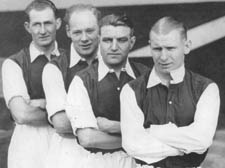|
|
 |
| |
 Arsenal internationals of the 1930s, from left, Jack Crayston, George Male, Eddie Hapgood and the legendary goalscorer Cliff Bastin Arsenal internationals of the 1930s, from left, Jack Crayston, George Male, Eddie Hapgood and the legendary goalscorer Cliff Bastin |
Brian’s longer shot at Gunners
Veteran writer Brian Glanville’s history of Arsenal paints a more beautiful literary picture of the game, writes Richard Osley
The Real Arsenal: From Chapman to Wenger – The Unofficial Story. By Brian Glanville.
JR Books £18.99.
GOODNESS, not another book about Arsenal, what’s left to say?
Every writer whose ever been to Highbury or the new Emirates Stadium seems to come away wanting to write a book about the club.
You can give yourself Gunners sickness overdosing on all the books that have been written on its history, especially in the era of Arsene Wenger’s management which has seen writers almost trip over themselves in a race to see who can write most poetically about the Frenchman’s transformation of the team.
They love florid adjectives about Patrick Vieira’s tough tackling and Thierry Henry’s slalom dribbles. It’s a saturated market.
But before you turn away, notice the author’s name: Brian Glanville, 78, a writer whose longevity as visitor to the Arsenal press box lifts his work beyond the run-of-the-mill histories which do little more than piece together the club through a jumble of half-forgotten scorelines.
Glanville, after all, was there at all the key moments himself. Not just in the 1990s, but in the 1950s as well. He can refer to his own notes and reports filed for newspapers at the time. More importantly, it seems, he can remember the days when journalists could speak sensibly to players, even knew some of them personally, without the accessory of chaperoning press officers.
Like the old lady reporter who sits in on every press briefing at the White House given by American presidents, often asking the most astute question, Glanville has been passing through Arsenal’s doors longer than anybody else bar the chairman’s family. The stadium has changed, the club crest has changed, the white sleeves on the famous red and white shirt have gone, so you could argue that his is one of the links with its illustrious past, even if he does label his book “The Unofficial Story”.
He wrote his first Arsenal book at 19, a ghost-written biography of a Gunners goalscorer of the past, Cliff Bastin, simply a man in baggy shorts to most of us, a hero to Glanville. In between novels and radio plays, he’s been writing about football ever since and with his grandfatherly wrinkles can now easily be recognised as the veteran of the press benches, sometimes muttering away to himself, sometimes joking with his colleagues.
I’ve seen people make silly faces behind his back as if to say what’s this old geezer doing here, I can only guess out of jealousy.
He was one of the first writers to write thoughtfully about football, taking reporting beyond those simple clichés of shots on goal being slotted, rifled and blasted into top corners. The same words you still see every week. No wonder this book does more than just tell you what the Arsenal versus Liverpool score was in 1989. His attention to fine detail is a strength.
The football-writing press is a funny world, seen close-up you see that everything is manipulated by sports reporters, mostly men, gaggled together to decide what the line for Monday’s back page will be and controlled as much as possible from the club’s side by press officers.
Access to information in Glanville’s early years was a given, now it’s almost like a reward system for glowing reports, while if too sharp a question is asked there is the lurking, unmentioned threat of having a match-day pass or interview rights removed. Not just at Arsenal, but throughout the Premier League. Some high profile managers for instance will not speak to the BBC because of grievances about past reports.
In this climate, sports journalists seem terrified of doing anything different than the normal my-boys-can-win reporting. But Glanville is from a time before communications departments and it shows. His first-hand impressions of the last 90 years at Arsenal explain how it has evolved into one of the world’s most famous teams through championship wins and cup triumphs, and a bit off the pitch politics. Interestingly, there is a low-key ending and no sweeping conclusions about the club’s future. That suggests this won’t be the last time Glanville writes a book about Arsenal. And any Gunners fan who cares about what happened before Wenger showed up should all be thankful for that.
|
 |
|
|
 |
 |
|
 |
|
 Arsenal internationals of the 1930s, from left, Jack Crayston, George Male, Eddie Hapgood and the legendary goalscorer Cliff Bastin
Arsenal internationals of the 1930s, from left, Jack Crayston, George Male, Eddie Hapgood and the legendary goalscorer Cliff Bastin
